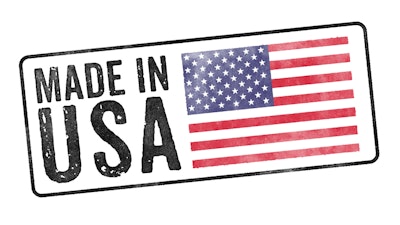
Supply chain nightmares with shipping delays, exorbitant cost increases and scarcity of ground transportation are making headlines daily. Companies are looking for ways to stay competitive and hold down the cost of goods in these tumultuous economic times.
Choosing to produce products in the U.S. is one way to relieve some supply chain issues. The decision of where to manufacture is not all cost driven. Some business leaders point to a more purposeful intent.
For Kano Laboratories, a producer of Kroil-branded penetrating oils and industrial-grade specialty chemicals, it’s important to support local businesses and our communities. Since the company’s founding in 1939, all sales, marketing, customer service, administrative and production operations are located in the U.S.
Placing a Value on American-Made Goods
A recent opinion survey indicates nearly 70% of Americans prefer to buy products labeled Made in the USA and are willing to pay a premium. The survey, conducted by The Reshoring Institute, found more than 83% said they would pay up to 20% more for products made domestically.
Does Made in the USA really matter to distributors and customers? Many companies make it part of their mission, some ask their key stakeholders directly.
Kano Laboratories has received direct and anecdotal feedback from distributors that they appreciate American-made products to support local businesses. Product users who engage on social media also said Made in the USA matters to them.
The Alliance for American Manufacturing is hearing that as well. In a national study, 92% of Americans had a favorable view of goods made in America. When asked for views on goods made in China, only 27% had a favorable view.
The study found several top reasons about why it matters to manufacture here in the U.S., including American jobs (79% said most or very important), its contribution to a strong economy (66%), the sector’s importance to national security (63%) and superior quality vs goods made outside the U.S. (59%).
Earning the Label
The Federal Trade Commission does not require Made in the USA labels, like it does for imported products manufactured outside the U.S. However, it does have oversight to those companies making false claims about American-made goods.
To earn the Made in the USA label, the FTC guidelines state “Made in USA means that ‘all or virtually all’ the product has been made in America. That is, all significant parts, processing and labor that go into the product must be of U.S. origin.”
Kano earned the label with all its products being 100% produced in America and a small percentage of the company’s packaging suppliers sourcing from outside of the U.S.
Business advantages
“Almost four in five corporations have already shifted production to the U.S. and at least 15% are considering it due to high tariffs and ongoing supply chain challenges,” according to a 2021 report by the Reshoring Institute.
For many manufacturers, producing goods domestically makes business sense. For some companies, it’s:
- A reduction in finances expended on advanced production and shipping costs
- Monitoring production closely and quickly resolving any issues
- To avoid rising costs in foreign countries
- Flexibility to adapt to any changes
According to a recent Bloomberg News report, the trend to bring manufacturing back to America is accelerating. Made in the USA can be a competitive advantage or a rallying cry for company workers and customers.
It’s a good time for company leadership to analyze its supply chain, weigh the opportunities and consider hopping on board the revitalization of the domestic manufacturing sector.
Sevan Demirdogen is CEO of Kano Laboratories, based in Nashville. Kano Labs is the producer of Kroil-branded penetrating oils and industrial-grade specialty chemicals.























